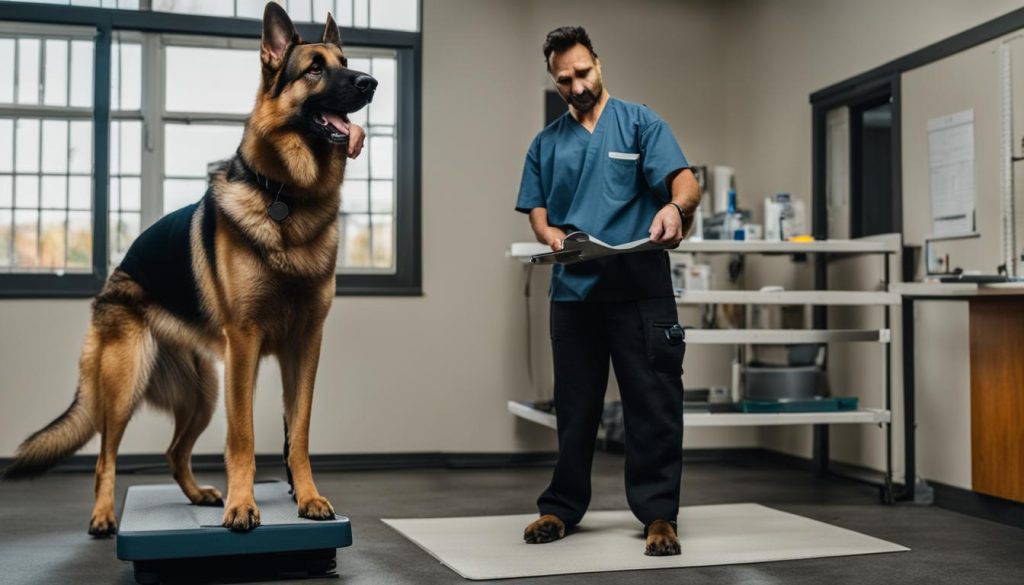German Shepherds are a popular breed known for their intelligence, loyalty, and protective nature. As a proud owner of a German Shepherd, you may be wondering when your furry friend will reach their full size and stop growing. In this article, I will explore the typical growth timeline of German Shepherds and the factors that can influence their growth and development.
Key Takeaways:
- German Shepherds typically reach their full size between 18-24 months of age.
- Females may reach their full height by 12-14 months, while males may take up to 18 months.
- Genetics, nutrition, and proper care play crucial roles in a German Shepherd’s growth.
- German Shepherd growth stages include the neonatal, transitional, socialization, juvenile, adolescent, and adult stages.
- Male and female German Shepherds have their unique growth and weight charts.
German Shepherd Growth Stages

German Shepherd growth can be divided into several stages, each characterized by specific physical and behavioral changes. Understanding these growth stages is essential for providing proper care and support to your German Shepherd. Let’s take a closer look at each stage:
1. Neonatal Stage
The neonatal stage begins at birth and lasts for the first two weeks of a puppy’s life. During this stage, German Shepherd puppies are completely dependent on their mother for nourishment and warmth. They spend most of their time sleeping and feeding, and their eyes and ears are closed.
2. Transitional Stage
The transitional stage occurs between weeks two and four, when the puppies begin to open their eyes and ears. They become more mobile and start to explore their surroundings. The mother gradually weans them off milk and introduces solid food.
3. Socialization Period
The socialization period, which typically lasts from weeks four to twelve, is a crucial stage for German Shepherd puppies. It is during this time that they learn social skills, develop bonds with humans and other animals, and experience new environments. Proper socialization is essential for their emotional well-being and overall behavior.
Continue reading the article to learn about the remaining growth stages, including the juvenile stage, adolescent stage, and adult stage. Discover how each stage contributes to the development of your German Shepherd and what you can do to ensure their optimal growth.
Male German Shepherd Growth & Weight Chart
When it comes to the growth of male German Shepherds, there is a general growth and weight chart that can serve as a guideline. Keep in mind that individual differences and genetic factors can influence the growth rate of each dog. However, this chart provides an overview of the expected height and weight ranges as male German Shepherds progress from one month to three years old.
| Age (months) | Height (inches) | Weight (pounds) |
|---|---|---|
| 1 | 4-6 | 5.5-9 |
| 3 | 12-15 | 20-25 |
| 6 | 20-22 | 48-55 |
| 12 | 24-26 | 79-88 |
As shown in the chart, male German Shepherds typically start off around 4-6 inches in height and 5.5-9 pounds in weight at one month old. By three months, they can grow to about 12-15 inches in height and weigh around 20-25 pounds. At six months old, male German Shepherds can reach 20-22 inches in height and weigh between 48-55 pounds. Finally, at three years old, they can attain their full height of 24-26 inches and weigh 79-88 pounds.
Please be aware that these numbers are not set in stone and may vary from dog to dog. Factors such as genetics, nutrition, and overall health can influence the growth rate. Regular veterinary check-ups and consultations with a professional breeder or veterinarian can provide more detailed information tailored to your specific male German Shepherd.
Female German Shepherd Growth & Weight Chart
Female German Shepherds, like their male counterparts, have a growth and weight chart that illustrates their development over time. Understanding the typical growth patterns of female German Shepherds can help owners ensure they are reaching their full potential. Below is a chart that outlines the average height and weight of female German Shepherds at different stages of their growth:
| Age | Height (inches) | Weight (pounds) |
|---|---|---|
| 1 month | 3-6 | 4.5-8 |
| 3 months | 9-13 | 18-24 |
| 6 months | 17-20 | 44-51 |
| 12 months | 21-23 | 57-64 |
| 18 months | 22-24 | 66-70 |
| 3 years | 22-24 | 66-70 |
It’s essential to note that these figures are averages and can vary depending on individual factors such as genetics, nutrition, and overall health. Proper care and a balanced diet play a significant role in supporting the healthy growth of female German Shepherds. Regular check-ups with a veterinarian can help monitor their growth progress and address any concerns that may arise.
By referencing the growth and weight chart, owners can track their female German Shepherd’s development and ensure they are thriving at each stage of their growth. Remember, providing appropriate nutrition, regular exercise, and veterinary care are key to promoting optimal growth and well-being.
Factors That Influence German Shepherd Growth
Several factors can influence the growth of German Shepherds. Genetics is one of the most crucial factors, as it determines their potential growth and size. German Shepherds inherit certain traits from their parents, including height, weight, and body structure. Therefore, if both parents are large and have a robust build, their offspring are likely to exhibit similar characteristics. On the other hand, if the parents are smaller or have certain health issues, it may affect the growth and development of their puppies.
Nutrition plays a significant role in the growth and development of German Shepherds. A balanced diet rich in essential nutrients, vitamins, and minerals is crucial for proper bone and muscle development. Puppies require a specialized diet that meets their specific needs, while adult German Shepherds need appropriate nutrition to maintain their size and strength. Feeding high-quality dog food and avoiding excessive treats or table scraps is essential to ensure optimal growth.
Exercise and physical activity also contribute to healthy growth in German Shepherds. Regular exercise helps strengthen their muscles and bones, promotes proper weight management, and supports overall development. Engaging in activities such as walking, running, playing fetch, and agility training can help to ensure that German Shepherds grow strong and fit. However, it is important to provide age-appropriate exercise and avoid excessive strain on growing joints and bones.
Factors That Influence German Shepherd Growth:
- Genetics: Inherited traits from parents.
- Nutrition: Balanced diet with essential nutrients.
- Exercise: Regular physical activity for muscle and bone development.
- Care and Veterinary Support: Regular check-ups and vaccinations for overall health monitoring.
Regular veterinary care is essential to monitor the growth and development of German Shepherds. Veterinarians can detect any potential health issues early on and provide appropriate guidance and treatment. Vaccinations protect against common diseases, while routine check-ups allow for the detection and prevention of any health concerns. By ensuring proper care and veterinary support, owners can promote healthy growth and provide their German Shepherds with the best chance for a long and fulfilling life.
| Factors That Influence German Shepherd Growth | Description |
|---|---|
| Genetics | Inherited traits from parents |
| Nutrition | Proper diet with essential nutrients |
| Exercise | Regular physical activity for muscle and bone development |
| Care and Veterinary Support | Regular check-ups and vaccinations for overall health monitoring |
Controlling German Shepherd Growth

Controlling the growth of German Shepherds is not a matter of completely dictating their growth rate, as it is primarily determined by their genetics, but there are certain factors that can be managed to promote optimal growth and development. By focusing on nutrition, exercise, and veterinary care, owners can ensure their German Shepherds grow into happy and healthy adults.
Proper nutrition is crucial for controlling a German Shepherd’s growth. It is important to provide them with a well-balanced diet that is tailored to their age, size, and activity level. Feeding them the right amount of high-quality dog food and avoiding overfeeding can help prevent excessive weight gain, which can lead to health problems. Consult with a veterinarian to determine the best diet plan for your German Shepherd.
Regular exercise is another key aspect of controlling growth. It helps develop strong muscles and supports healthy bone growth. Providing daily exercise, such as walks, playtime, and mental stimulation, helps ensure that your German Shepherd’s growth is balanced and controlled. However, it is important to avoid excessive exercise, particularly during the critical growth stages, as it can put strain on their growing bones and joints.
Veterinary guidance and check-ups are essential for monitoring a German Shepherd’s growth and addressing any concerns. Regular visits to the veterinarian allow for early detection of any potential health issues and ensure that your dog receives appropriate healthcare. The veterinarian can also provide guidance on growth-related topics and help establish a growth plan tailored to your German Shepherd’s needs.
Controlling the growth of German Shepherds requires a holistic approach that takes into account nutrition, exercise, and veterinary care. By managing these factors effectively, owners can help their German Shepherds grow into healthy and well-developed adults.
Optimal Growth for German Shepherds
Ensuring the optimal growth of German Shepherds is essential for their overall well-being and development. To achieve this, it is important to provide them with proper nutrition, regular exercise, socialization, and veterinary care.
Nutrition: Feeding a balanced diet specifically formulated for puppies is crucial during their growth stages. This diet should contain the right balance of proteins, carbohydrates, fats, vitamins, and minerals. As they transition to adulthood, gradually introduce adult food that meets their nutritional needs. It is important to follow the recommended feeding guidelines based on their age, size, and activity level.
Exercise: Regular exercise is vital for a German Shepherd’s growth and development. They are an active breed that requires daily physical activity to strengthen their muscles and bones. Engage them in activities such as walks, playtime, and obedience training. Mental stimulation through interactive toys and puzzles can also contribute to their overall well-being.
Socialization and Veterinary Care: Socialization plays a significant role in a German Shepherd’s growth. Introduce them to various environments, people, and other animals from an early age, helping them develop emotionally and behaviorally. Additionally, regular veterinary check-ups are essential to monitor their growth, address any concerns, and ensure they receive necessary vaccinations and preventive care.
| Key Factors for Optimal Growth | Guidelines |
|---|---|
| Nutrition | Provide a balanced diet tailored to their age, size, and activity level. Follow recommended feeding guidelines. |
| Exercise | Engage in daily physical activity to strengthen muscles and bones. |
| Socialization | Expose them to various environments, people, and animals for emotional and behavioral development. |
| Veterinary Care | Schedule regular check-ups, vaccinations, and preventive care with a trusted veterinarian. |
By prioritizing these key factors, you can ensure that your German Shepherd experiences optimal growth, leading to a healthy and fulfilling life. Remember to consult with your veterinarian for personalized guidance and advice to meet your dog’s specific needs.
Quote:
Providing a balanced diet, regular exercise, socialization, and veterinary care are the cornerstones of optimal growth for German Shepherds. By focusing on these factors, you can help your dog reach their full potential and enjoy a happy and healthy life.
How to Ensure Your German Shepherd is Healthy
Ensuring the health and well-being of your German Shepherd is crucial for their overall happiness and longevity. By following a few key steps, you can promote a healthy lifestyle and address any potential health concerns. Here are some essential tips to help keep your German Shepherd in optimal health:
1. Provide a Well-Rounded Diet
A nutritious diet is the foundation of a healthy German Shepherd. Opt for high-quality dog food specifically formulated for their age, size, and activity level. Include a balance of proteins, carbohydrates, fats, vitamins, and minerals to support their growth and development. Consult with your veterinarian for personalized dietary recommendations and portion sizes.
2. Regular Exercise and Mental Stimulation
Regular exercise is essential for maintaining the physical and mental well-being of your German Shepherd. Engage them in daily activities that stimulate their mind and body, such as walks, runs, playtime, and training sessions. This helps keep their muscles strong, joints limber, and their mind sharp. Provide them with interactive toys and puzzles to keep them mentally stimulated and prevent boredom.
3. Regular Veterinary Check-ups and Vaccinations
Regular veterinary check-ups are vital for monitoring your German Shepherd’s health and detecting any potential issues early on. Schedule routine visits for vaccinations, physical examinations, and preventive care. Your veterinarian can provide guidance on maintaining their dental health, parasite control, and any breed-specific health concerns. Stay up to date with vaccinations to protect your German Shepherd from common diseases.
4. Socialization and Training
Socialization plays a critical role in the emotional well-being of your German Shepherd. Expose them to various environments, people, and animals from a young age to help them develop a confident and friendly disposition. Enroll them in obedience training classes to ensure they learn proper behavior and respond to commands. Training also helps strengthen the bond between you and your dog.
By implementing these essential practices, you can ensure that your German Shepherd remains healthy, happy, and thriving throughout their life. Remember to consult with your veterinarian for personalized advice based on your dog’s unique needs and characteristics.
Common Health Issues in German Shepherds

German Shepherds are majestic and intelligent dogs, but like any breed, they are prone to certain health issues. It is important for owners to be aware of these common health concerns to ensure their German Shepherds receive proper care and attention.
“The better informed you are about your dog’s health, the better equipped you will be to provide the necessary care and prevention.”
One of the most prevalent health issues in German Shepherds is hip dysplasia. This condition occurs when the hip joint does not develop properly, leading to pain, lameness, and arthritis. Regular exercise and maintaining a healthy weight can help manage the symptoms of hip dysplasia, but in severe cases, surgery may be required.
Gastrointestinal problems, such as bloating and digestive disorders, are also common in German Shepherds. These issues can cause discomfort, vomiting, diarrhea, and weight loss. Feeding your German Shepherd smaller, frequent meals and avoiding exercise immediately after meals can help prevent bloating. A balanced diet and regular veterinary check-ups are essential for maintaining a healthy digestive system.
Table: Common Health Issues in German Shepherds
| Health Issue | Description | Prevention/Treatment |
|---|---|---|
| Hip Dysplasia | Developmental malformation of the hip joint, leading to pain and lameness. | Regular exercise, weight management, and potential surgery. |
| Gastrointestinal Problems | Bloating, digestive disorders, vomiting, diarrhea, and weight loss. | Small, frequent meals, avoiding exercise after meals, balanced diet, and regular veterinary check-ups. |
| Bloat | A life-threatening condition caused by the twisting of the stomach. | Feeding smaller, frequent meals, avoiding exercise after meals, and prompt veterinary attention. |
Bloat, or gastric dilatation-volvulus, is a serious and life-threatening condition that commonly affects German Shepherds. It occurs when the stomach twists, trapping air and preventing the dog from vomiting or burping. This emergency situation requires immediate veterinary attention to alleviate the bloating and potentially correct the twisted stomach.
Regular veterinary check-ups, early detection, and preventive care are essential for managing and treating these common health issues. As responsible owners, it is our duty to provide our German Shepherds with the best possible care to ensure they lead healthy, happy lives.
Wrapping Up
Understanding the growth and development of German Shepherds is crucial for providing them with the best care and support. By knowing when they stop growing and the different growth stages they go through, we can ensure their optimal development and well-being. It’s important to consider the factors that influence their growth, such as genetics, nutrition, exercise, and veterinary care.
Proper nutrition plays a significant role in promoting healthy growth patterns for German Shepherds. Providing a balanced diet tailored to their age, size, and activity level is essential. Regular exercise and physical activity help strengthen their muscles and bones and contribute to their overall growth and development. Additionally, socialization and training are important for their emotional well-being and behavioral development.
Regular veterinary check-ups are crucial in monitoring their growth and addressing any potential health issues. By staying proactive in their healthcare, we can detect and prevent common health issues in German Shepherds, such as hip dysplasia, gastrointestinal problems, and bloat. By providing them with the proper care, owners can ensure that their German Shepherds reach their full potential and lead a healthy and fulfilling life.
FAQ
When do German Shepherds stop growing?
German Shepherds typically reach their full size and stop growing between 18-24 months of age.
What are the growth stages of a German Shepherd?
German Shepherd growth can be divided into several stages, including the neonatal stage, transitional stage, socialization period, juvenile stage, adolescent stage, and adult stage.
What is the growth and weight chart for male German Shepherds?
Male German Shepherds gradually increase in height and weight from one month to three years old. For example, at one month, they typically measure around 4-6 inches in height and weigh 5.5-9 pounds. By three years old, they can measure 24-26 inches in height and weigh 79-88 pounds.
What is the growth and weight chart for female German Shepherds?
Female German Shepherds also have a growth and weight chart. At one month old, they usually measure 3-6 inches in height and weigh 4.5-8 pounds. When they reach maturity around three years old, they can measure 22-24 inches in height and weigh 66-70 pounds.
What factors influence the growth of German Shepherds?
Genetics, nutrition, exercise, and proper care are significant factors that influence the growth of German Shepherds.
Can the growth of German Shepherds be controlled?
While it is not possible to control a German Shepherd’s growth rate completely, factors such as nutrition, exercise, and regular veterinary care can be managed to promote optimal growth.
How can I ensure optimal growth for my German Shepherd?
Providing a balanced diet, regular exercise, socialization, and veterinary care are key to ensuring optimal growth for German Shepherds.
How can I ensure my German Shepherd is healthy?
To ensure your German Shepherd’s health, provide a well-rounded diet, regular exercise, socialization, and regular veterinarian check-ups and vaccinations.
What are common health issues in German Shepherds?
German Shepherds are prone to health issues such as hip dysplasia, gastrointestinal problems, and bloat.
How does the growth and development of German Shepherds progress?
Understanding the growth and development stages of German Shepherds is crucial for their overall well-being and can help owners provide the best care and support.






